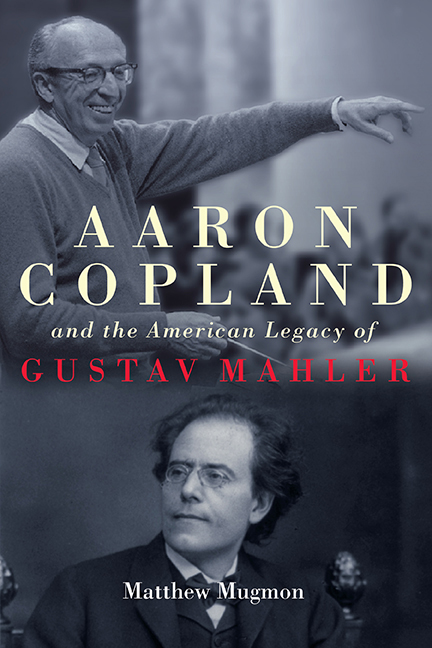Book contents
- Frontmatter
- Dedication
- Contents
- Acknowledgments
- Note on Musical Examples
- Introduction
- 1 Mahler and Copland in New York
- 2 Mahler in Nadia Boulanger's Studio and Beyond
- 3 Copland in Defense of Mahler
- 4 Mahler in Copland's Jewish Romanticism
- 5 Mahler's Idiom in Copland's “American” Sound
- 6 Copland, Koussevitzky, Mahler, and the Canon
- 7 Copland's Role in Bernstein's Mahler Advocacy
- Conclusion
- Notes
- Bibliography
- Index
- Eastman Studies in Music
7 - Copland's Role in Bernstein's Mahler Advocacy
Published online by Cambridge University Press: 18 September 2019
- Frontmatter
- Dedication
- Contents
- Acknowledgments
- Note on Musical Examples
- Introduction
- 1 Mahler and Copland in New York
- 2 Mahler in Nadia Boulanger's Studio and Beyond
- 3 Copland in Defense of Mahler
- 4 Mahler in Copland's Jewish Romanticism
- 5 Mahler's Idiom in Copland's “American” Sound
- 6 Copland, Koussevitzky, Mahler, and the Canon
- 7 Copland's Role in Bernstein's Mahler Advocacy
- Conclusion
- Notes
- Bibliography
- Index
- Eastman Studies in Music
Summary
To many music lovers, the mere mention of Gustav Mahler conjures up an image of Leonard Bernstein poised at the conductor's podium to lead an impassioned performance of an hour-long symphony. As a conductor, Bernstein garnered most of the credit for having popularized Mahler's music in the twentieth century. From 1960, he was the driving force behind a significant initiative to bring Mahler to a prominent place in the canon of Western art music. As the recently minted music director of the New York Philharmonic and one of the most celebrated musicians in the United States, Bernstein that year presided over the orchestra in a celebration of Mahler's hundredth birthday, conducting several of Mahler's works and starring in the national CBS broadcast of the Young People's Concert “Who Is Gustav Mahler?” He went on to conduct and record all of Mahler's symphonies multiple times with major orchestras, and he continued to bolster his reputation as the world's leading Mahler interpreter.
In establishing the genesis of Bernstein's lifelong relationship with Mahler's music, scholars have, with good reason, highlighted his position in a lineage of conductors. Such figures were certainly the most visible and readily noticed Mahler proponents. It has been tempting to conclude that, in the generation after Mahler, it was Bernstein's conducting mentors who eventually prompted him to follow in their footsteps and perform Mahler's works. In a 2008 article, James M. Keller explained Bernstein's Mahler encounter in just these terms; Keller wrote that Bernstein's “formative years as a musician had placed him in the orbits of numerous figures who qualified as Mahler champions,” and he named specifically Artur Rodzinski, Bruno Walter, Fritz Reiner, Serge Koussevitzky, and Dimitri Mitropoulos—all conductors—as Bernstein's predecessors in this realm. In a detailed dissertation on Bernstein and Mahler, Christopher Jarrett Page aligned performance dates to argue that Bernstein's decision to perform Mahler, specifically the Second Symphony (in 1947) and Das Lied von der Erde (in 1950), emerged as “a direct result of watching one of his mentors [Rodzinski for the Second Symphony, Koussevitzky for Das Lied] rehearse and conduct the work before him.”
- Type
- Chapter
- Information
- Aaron Copland and the American Legacy of Gustav Mahler , pp. 140 - 171Publisher: Boydell & BrewerPrint publication year: 2019



